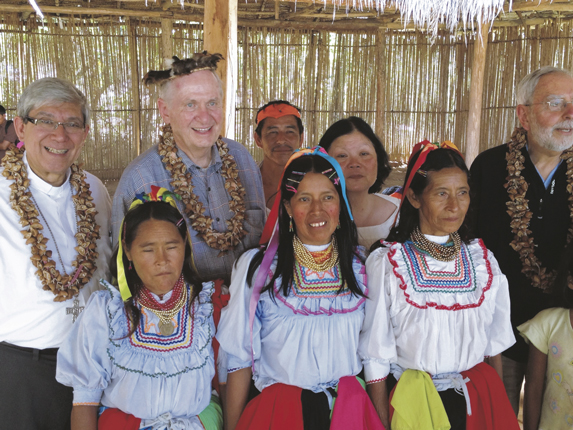by Barbara J. Fraser

LAMAS, Peru (CNS) – Conflicts over natural resources and land rights in places like Peru and Colombia echo similar problems in the U.S., said U.S. bishops who visited the two countries in late June.
“We came to express solidarity with the church in Peru and Colombia, that we are one family in Christ, and the concerns of one part of the family are the concerns of the other,” said Bishop Gerald F. Kicanas of Tucson, Ariz.
He said the bishops also wanted “to understand more clearly the challenges of the church in Peru and Colombia,” so they could talk about those issues with U.S. Catholics and government officials.
The group also included Bishop Richard E. Pates of Des Moines, Iowa; Auxiliary Bishop Octavio Cisneros of Brooklyn; Carolyn Woo, president and CEO of the U.S. bishops’ Catholic Relief Services (CRS); and staff members from CRS and the bishops’ conference.
Before traveling to Peru, they spent two days in Colombia, meeting with bishops, members of the Catholic Church’s social ministry and U.S. Embassy officials and visiting Ciudad Bolivar, a sprawling low-income district on the south side of Bogota, the Colombian capital.
In Peru, they spent a day in an Amazonian indigenous community and met with Church officials and members of organizations with which CRS works.
In both countries, some discussion focused on conflicts between communities and extractive industries such as mining, Bishop Pates said. Minerals account for more than 60 percent of Peru’s exports and are a growing share of Colombia’s economy, but environmental issues and other problems often cause friction with local communities.
Church workers and communities “are addressing (the problems), but now they need to enter into more direct dialogue with the governments and the corporations that are involved,” said Bishop Pates, chairman of the U.S. bishops’ Committee on International Justice and Peace.
In Bogota, the bishops also received a briefing on the peace talks underway between the Colombian government and the Revolutionary Armed Forces of Colombia in an effort to end a decades-long armed conflict that has displaced more than 3.5 million people, according to official government figures.
Because of its credibility, “the church is seen as a mediator” and plays a role in “trying to shape the discussion in such a way that there is achievement of peace,” Bishop Pates said.
“CRS has a great deal of experience in peacebuilding here in Latin America and in other areas, so that needs to remain an important theme” for the organization as it plans for the future, said Bishop Kicanas, president of the CRS board of directors.
